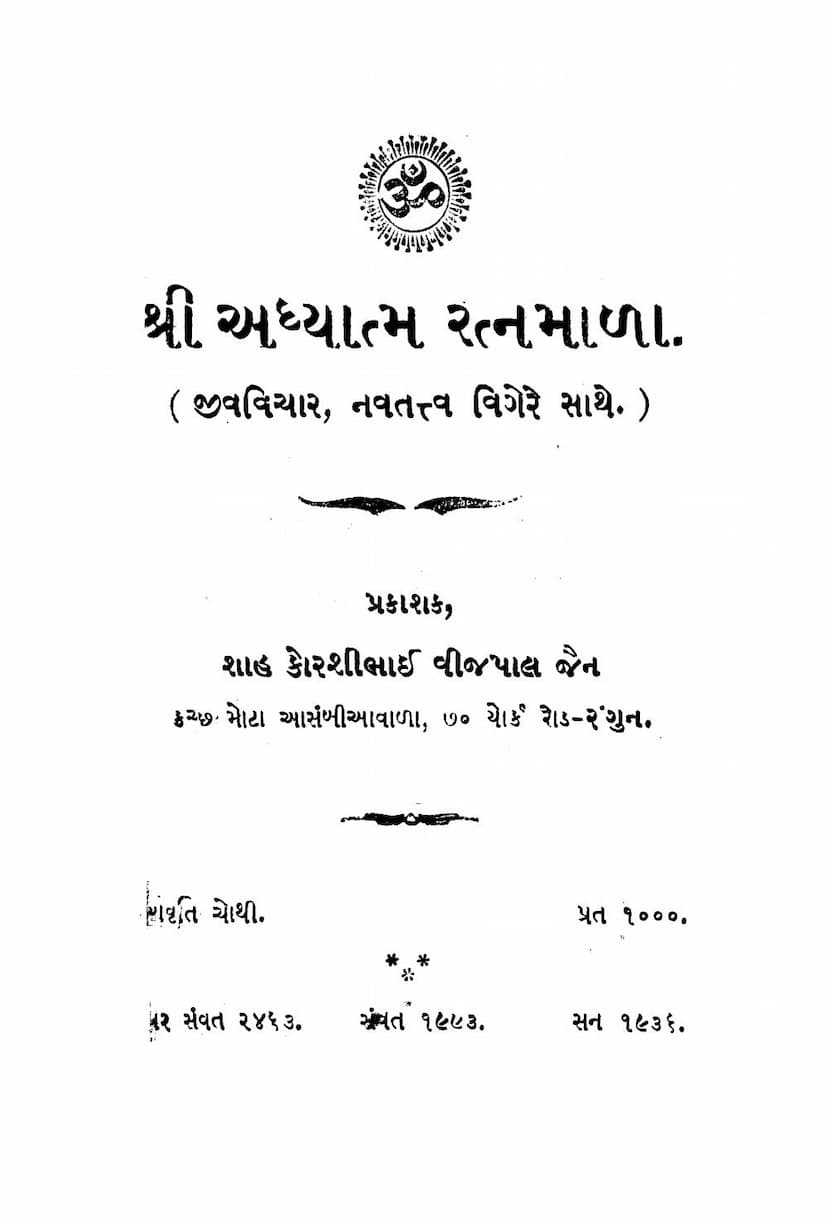Adhyatma Ratnamala
Added to library: September 1, 2025

Summary
Here's a comprehensive summary of the Jain text "Adhyatma Ratnamala" based on the provided pages:
Overview:
"Adhyatma Ratnamala" (Ornamental Garland of Spirituality) compiled by Korshibhai Vijpal Jain and published by himself, is presented as a collection of spiritual writings and devotional hymns aimed at guiding spiritual seekers. The text emphasizes self-knowledge and the path to liberation through adherence to Jain principles.
Key Contents and Themes:
- Spiritual Guidance: The book is described as a "lamp" for those embarking on the "difficult but auspicious path of self-knowledge." It aims to provide guidance for spiritual aspirants.
- Collection of Devotional Works: The text includes a wide range of devotional hymns (stotras), poems (sajhay, chhand, raas), and philosophical treatises relevant to Jainism.
- Inclusion of Key Jain Doctrines: The fourth edition specifically includes "Jeev Vichar" (Analysis of the Soul), "Navatattva" (Nine Principles), "Dandak" (Classification of Existences), and "Laghu Sanghani" (A Concise Treatise on Association), suggesting a comprehensive approach to Jain philosophy.
- Devotion to Tirthankaras: The book features numerous hymns dedicated to the 24 Tirthankaras, including detailed praises and narratives about their lives and spiritual journeys.
- Emphasis on Virtues: The text implicitly promotes virtues such as non-violence (Ahimsa), non-attachment (Vairagya), truthfulness, contentment, and self-control through the devotional content.
- Biographical Accounts: The introductory sections include a brief biography of the publisher's late wife, Ratanbai, highlighting her virtuous life, devotion, and the family's commitment to spiritual and educational endeavors. It also mentions the untimely demise of their son, Revjibhai, and their daughter Panbai's renunciation (Diksha).
- Publisher's Intent: The publisher, Korshibhai Vijpal Jain, expresses his gratitude for the spiritual guidance received from his Guru, Sri Kapurchandji Maharaj, and his desire to disseminate these teachings to benefit others. The multiple editions of the book indicate its popularity and the publisher's commitment to spreading this knowledge.
- Philanthropic Activities: The publisher's family is noted for their philanthropic activities, including establishing educational institutions and building religious structures, which are mentioned in the context of honoring their departed elders.
- Structure and Content: The book's extensive index reveals a wide array of topics covered, including:
- Prayers and hymns to various Tirthankaras (Shri Simandhar Swami, Rishabh, Ajit, Sambhav, Abhinandan, Sumati, Padmaprabha, Suparshva, Chandraprabha, Suvidhi, Sheetal, Shreyans, Vasupujya, Vimalanatha, Anantanatha, Dharmnath, Shantinatha, Kunthunath, Arhanatha, Mallinath, Munisuvrata, Naminatha, Neminatha, Parshvanatha, Mahavirswami).
- Sajhay (narrative poems) on various spiritual concepts like the eight stages of perception (Aath Drishti), five contemplations (Panch Bhavana), and the six senses (Vis Samasadi).
- Texts on soul analysis (Jiv Vichar), principles (Navatattva), and classifications (Dandak).
- The importance of the Navkar Mantra is highlighted with a "Chhand" (metered verse) explaining its significance and benefits.
- The text also includes philosophical discussions like "Syadvada" (The theory of manifold predications).
Publisher's Note (Prakashak nu Nivedan):
The publisher, Shah Korshibhai Vijpal Jain, details the genesis of the book. He was inspired by the teachings of Upadhyay Maharaj Shri Ravichandji Maharaj's disciple, Shri Kapurchandji Maharaj, during a visit to Kutch in Samvat 1983. The book, initially a collection of Suktis (wise sayings) compiled by Shri Kapurchandji Maharaj, underwent several editions due to popular demand. The fourth edition includes additional materials like "Chattalio" and "Diksha" stanzas by Sadhvi Shri Pushpashriji, along with foundational Jain texts like "Jeev Vichar," "Navatattva," "Dandak," and "Laghu Sanghayani." He expresses gratitude to Shri Amarchandbhai of Shri Bahadur Singhji Printing Press in Palitana for the meticulous printing of this fourth edition.
Dedication (Nivapananjali):
The book is lovingly dedicated to the publisher's deceased father, Ravjibhai, and his mother, Shrimati Ratanbai. The dedications speak of their virtuous qualities, their role as ideals for their children, and the profound impact they had on the family.
Biographical Note on Shrimati Ratanbai:
Shrimati Ratanbai, born in Bidada, Kutch, in Samvat 1936, had limited formal education but received strong spiritual and ethical grounding from her family. Her marriage to Korshibhai Vijpal Jain at the age of 13 marked the beginning of a life that, despite material wealth, was characterized by simplicity, piety, and a dedication to knowledge propagation. Her influence extended to her son Revjibhai and her daughters, particularly Panbai, who later embraced spiritual life. Ratanbai's strong sense of charity and respect for elders are highlighted. Her passing in Samvat 1983, after a brief illness in Bidada, is noted with sorrow, followed by the family's continuation of her philanthropic legacy.
Overall Impression:
"Adhyatma Ratnamala" is a significant work in Gujarati Jain literature, offering a rich repository of devotional poetry, philosophical insights, and biographical sketches. It reflects a deep commitment to spiritual practice, moral uprightness, and the propagation of Jain teachings, deeply rooted in the publisher's personal journey and family heritage. The inclusion of foundational texts alongside devotional hymns makes it a valuable resource for spiritual learning and practice.